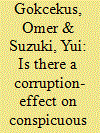| Srl | Item |
| 1 |
ID:
133881


|
|
|
|
|
| Publication |
2014.
|
| Summary/Abstract |
This study empirically explores the following issue: Does corruption fuel conspicuous consumption? It examines the existence and magnitude of any potential corruption-effect on conspicuous consumption expenditure. Regression analyses of an unbalanced panel data for 20 OECD countries between 2004 and 2010 indicate that luxury car sales are higher by 191 per cent in a country with a high perceived corruption level, for example, CPI score of 4.5, as compared to a country with a low perceived corruption level, for example, CPI score of 9.0, ceteris paribus.
|
|
|
|
|
|
|
|
|
|
|
|
|
|
|
|
| 2 |
ID:
182784


|
|
|
|
|
| Summary/Abstract |
The unpegging of China's currency in 2005 creates positive wealth effects that trigger Chinese foreign buyers' responses to pay 3.42% more in housing prices relative to other foreign buyers. We find evidence of a higher propensity to purchase housing units with more visible features among Chinese foreign buyers after the policy shock relative to other foreign buyers. Chinese foreign buyers pay 11.0% premiums for high-floor units, 7.25% premiums for large units and 4.61% for luxury (more expensive) units after experiencing positive incomrtde shocks. We find that conspicuous consumption motives are augmented in high-income neighborhoods and neighborhoods with strong enclaves and social networks comprising residents from China. We show that conspicuous consumption motives are more significant for Chinese foreign buyers who are owner occupiers than for those who are investors. The results survive a slew of robustness and falsification tests, and we cannot reject the finding of wealth-induced conspicuous consumption by Chinese foreign buyers in Singapore's private housing market.
|
|
|
|
|
|
|
|
|
|
|
|
|
|
|
|
| 3 |
ID:
192930


|
|
|
|
|
| Summary/Abstract |
Processes of making, sustaining, reforming, and un-making world orders are constants in global politics and development. Understood in the neo-Gramscian tradition pioneered by Robert Cox, ideas, institutions, and material capabilities combine to shape the range of possibilities for more and less stable orders. Sports mega-events (SMEs)—most prominently, the Olympic Games—have played an underappreciated role in this process. This paper examines the ways in which the Olympics manifested and supported the rise of globalized neoliberal hegemony in the early 1980s, the reconfiguration and erosion of this order through the 1990s and 2000s, and efforts to fundamentally revise this order in the new millennium. Particular emphasis is placed on the dual role of SMEs and the Olympics as manifestations of conspicuous consumption and the pursuit of prestige on the one hand, and as focal points for sanctions campaigns and boycotts on the other.
|
|
|
|
|
|
|
|
|
|
|
|
|
|
|
|